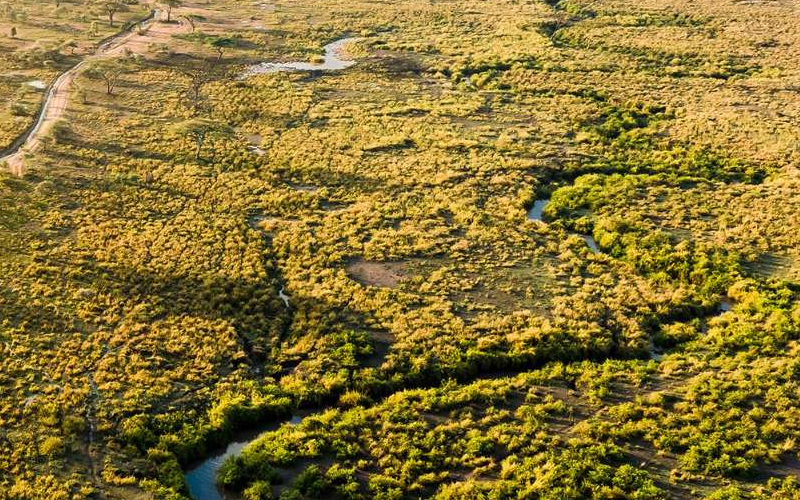Tanzania New UNESCO World Heritage Site 2024
In an exciting development for Tanzania’s cultural and natural heritage, UNESCO has declared a new Tanzanian site a World Heritage Treasure in 2024. This prestigious designation highlights the global significance of the site and its importance in preserving both cultural history and biodiversity. Tanzania, already home to several renowned UNESCO World Heritage Sites, including Serengeti National Park and Kilimanjaro National Park, now adds another jewel to its list of globally recognized landmarks. The new designation not only underscores Tanzania’s rich heritage but also promises to boost tourism and conservation efforts in the region.

Francisco Raymond
Tanzania Safari Specialist
Plan a memorable Tanzanian adventure?
Save time and ensure an incredible safari experience by getting quotes from our Tanzania safari and trekking specialist
The Newly Designated UNESCO World Heritage Site
The latest addition to Tanzania’s World Heritage roster is the Eastern Arc Mountains, a series of ancient, biodiverse mountain ranges located in the eastern part of the country. The Eastern Arc Mountains, often referred to as the “Galápagos of Africa,” are celebrated for their exceptional levels of biodiversity, endemism, and unique ecosystems that have evolved over millions of years. This designation is a recognition of the mountains’ unparalleled contribution to global biodiversity and the need for enhanced conservation efforts to protect their fragile environment.
- Location and Geographic Significance: The Eastern Arc Mountains span several regions in Tanzania, stretching from the Taita Hills in Kenya down to the Udzungwa Mountains in southern Tanzania. They include several notable ranges, such as the Uluguru, Usambara, and Udzungwa Mountains. These ranges are characterized by their rich forests, mist-covered peaks, and deep valleys, creating a unique environment that supports a wide variety of plant and animal species found nowhere else on Earth.
- Biodiversity Hotspot: The Eastern Arc Mountains are renowned for their extraordinary biodiversity. The forests are home to a staggering number of endemic species, including rare primates, birds, reptiles, and plants. Notable species include the critically endangered Sanje mangabey and the Udzungwa red colobus, as well as over 800 plant species that exist only in this region.
These mountains are considered one of the most biologically important regions in Africa, with conservationists calling them an “ecological goldmine.” The high levels of endemism make the Eastern Arc Mountains one of the world’s most important biodiversity hotspots, underscoring the need to protect this unique environment from deforestation, climate change, and habitat degradation.
Why the Eastern Arc Mountains Were Chosen by UNESCO
Outstanding Universal Value
UNESCO designates World Heritage Sites based on their “Outstanding Universal Value,” meaning they hold cultural or natural significance that transcends national boundaries and are of importance to all of humanity. The Eastern Arc Mountains meet these criteria by offering an exceptional example of how ancient ecosystems can sustain extraordinary biodiversity over millennia.
Cultural and Historical Importance
In addition to their ecological significance, the Eastern Arc Mountains are also important to the cultural history of Tanzania. For centuries, these mountains have been home to indigenous communities that have lived in harmony with the environment, relying on the forests for their livelihoods. The forests hold cultural and spiritual significance for these communities, and their traditional knowledge of sustainable resource management has been key to the preservation of the region.
The mountains are also home to sacred sites and historical landmarks that reflect the deep connection between the people and their natural surroundings. By designating the Eastern Arc Mountains as a World Heritage Site, UNESCO recognizes both the ecological and cultural heritage of the region.
Impact of UNESCO Recognition on Conservation Efforts
- Boost to Conservation Initiatives
The UNESCO designation is expected to bring greater international attention and resources to the conservation of the Eastern Arc Mountains. With this new status, the Tanzanian government, along with global conservation organizations, will have more opportunities to secure funding and support for projects aimed at protecting the region’s unique biodiversity.
This recognition will likely lead to stricter conservation regulations to prevent illegal logging, deforestation, and unsustainable agricultural practices that have threatened parts of the forest in the past. Additionally, eco-tourism initiatives in the area are expected to expand, creating more opportunities for sustainable development that benefits local communities while protecting the environment.
- Collaborative Conservation Efforts
The UNESCO designation also encourages collaboration between government agencies, local communities, and international organizations to ensure that conservation efforts are inclusive and effective. Local communities, who have traditionally played a role in preserving the mountains, will be involved in efforts to manage the land, ensuring that their cultural practices and livelihoods are respected while promoting sustainable use of the resources.
Conservationists and scientists from around the world will also be drawn to the Eastern Arc Mountains to study its unique ecosystems and develop strategies to protect its endangered species. Research and conservation programs will benefit from the increased visibility and funding that often accompany UNESCO World Heritage status.

Francisco Raymond
Tanzania Safari Specialist
Plan a memorable Tanzanian adventure?
Save time and ensure an incredible safari experience by getting quotes from our Tanzania safari and trekking specialist
Tourism and Economic Benefits of UNESCO Designation
- Increased Tourism Potential
The recognition of the Eastern Arc Mountains as a World Heritage Site is expected to boost tourism to the region significantly. With UNESCO’s endorsement, the area will attract more eco-tourists and nature enthusiasts interested in exploring its pristine forests, rich wildlife, and unique landscapes. For visitors looking to experience Tanzania beyond the famous Northern Circuit, the Eastern Arc Mountains offer an alternative destination for adventure and wildlife tourism.
- Sustainable Eco-Tourism Initiatives
Eco-tourism in the Eastern Arc Mountains will be developed in a way that supports conservation while providing economic benefits to local communities. New lodges, hiking trails, and guided tours will be designed with sustainability in mind, ensuring that tourism does not harm the fragile environment. Local guides will play a key role in these initiatives, offering tourists an authentic experience while providing employment opportunities for people living near the mountains.
The increased tourism brought by UNESCO recognition also presents an opportunity to educate visitors about the importance of biodiversity conservation and the unique ecosystems of the Eastern Arc Mountains. Eco-tourism programs will likely include conservation education as a core component, helping to raise awareness about the need to protect this globally important region.
- Support for Local Communities
Increased tourism and global recognition will also bring economic benefits to the communities living near the Eastern Arc Mountains. By promoting community-based tourism initiatives, local residents can directly benefit from the increased flow of visitors, whether through guiding services, craft-making, or hospitality.
Additionally, the revenues generated from eco-tourism can be reinvested into local infrastructure, healthcare, and education, ensuring that the surrounding communities benefit from the region’s new status as a World Heritage Site.
The Future of the Eastern Arc Mountains
The UNESCO designation of the Eastern Arc Mountains in 2024 is a significant milestone in the region’s conservation and development. By recognizing the mountains as a World Heritage Site, UNESCO has drawn international attention to one of Africa’s most important ecological regions. This status will serve as a catalyst for increased conservation efforts, eco-tourism development, and sustainable economic growth in the area.
As the Eastern Arc Mountains become more widely known and appreciated by travelers, researchers, and conservationists, Tanzania has the opportunity to showcase its commitment to preserving both its natural and cultural heritage. With the right balance of conservation, tourism, and community involvement, the Eastern Arc Mountains will continue to thrive as one of the world’s most unique and irreplaceable ecosystems.

Francisco Raymond
Tanzania Safari Specialist
Plan a memorable Tanzanian adventure?
Save time and ensure an incredible safari experience by getting quotes from our Tanzania safari and trekking specialist
UNESCO’s designation of Tanzania’s Eastern Arc Mountains as a World Heritage Site in 2024 is a momentous achievement for both the country and the global conservation community. Recognized for its extraordinary biodiversity, cultural significance, and ecological value, the Eastern Arc Mountains now stand alongside other iconic World Heritage Sites. This new status not only elevates Tanzania’s profile as a leading destination for eco-tourism but also paves the way for enhanced conservation efforts to protect the region’s fragile ecosystems for generations to come.
FAQs
- Why were the Eastern Arc Mountains designated a UNESCO World Heritage Site?
The Eastern Arc Mountains were designated for their exceptional biodiversity, high levels of endemism, and cultural significance, meeting UNESCO’s criteria for Outstanding Universal Value. - What kind of wildlife can be found in the Eastern Arc Mountains?
The Eastern Arc Mountains are home to rare and endangered species, including the Sanje mangabey, Udzungwa red colobus, and numerous endemic plant species. - How will the UNESCO designation impact tourism in the region?
The UNESCO designation is expected to boost eco-tourism in the Eastern Arc Mountains, attracting visitors interested in wildlife, conservation, and sustainable travel experiences. - What are the conservation challenges facing the Eastern Arc Mountains?
The Eastern Arc Mountains face challenges such as deforestation, habitat loss, and climate change. The UNESCO designation will help bring international attention and resources to address these threats. - How does the UNESCO designation benefit local communities?
Local communities will benefit from increased tourism, job opportunities, and infrastructure development, as well as initiatives that involve them in the conservation and sustainable management of the region.
Plan Your Tanzania Adventure with Confidence!
Check out our pages for important information on:
- Payment Method
- Tanzania Safari FAQ
- Tanzania Visa Application FAQs
- Kilimanjaro FAQs
- Best Time to Visit Tanzania
- Tanzania Food
- Which Kilimanjaro Route to Choose?
- Zanzibar Vacation
Visit our website for all the details you need to ensure an unforgettable experience!


